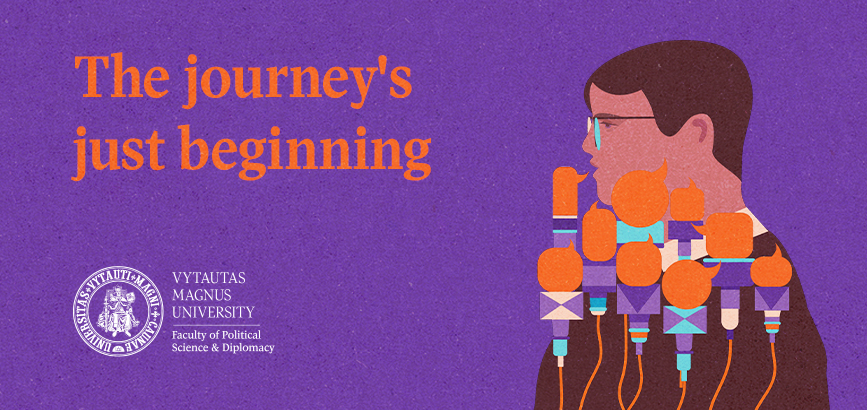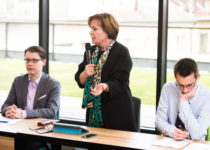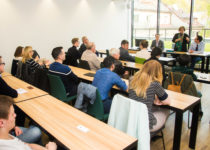Public Lecture About Day-To-Day Issues in UE
 What are the main actualities of the European Union institutions ? Which main jobs are working EU leaders in this moment? Is it possible to solve all problems of the EU in quick way? This and other questions will be answered during public lecturer Dealing with day-to-day issues in UE: consumer protection, food safety, double food standards, border protection and others.
What are the main actualities of the European Union institutions ? Which main jobs are working EU leaders in this moment? Is it possible to solve all problems of the EU in quick way? This and other questions will be answered during public lecturer Dealing with day-to-day issues in UE: consumer protection, food safety, double food standards, border protection and others.
Visiting lecturer of Department of Political Science will be Laimutė Pilukaitė, Deputy Head of Representation of European Commission in Lithuania, Team Leader – Political Reporting &Policy Analysis in the Representation
Lecture will take place on 23-th of October, at 1pm., Putvinskio 23, room 311.
Prof. M. Holmila Public Lectures on Alcohol’s Harm Issues
 We are pleased to invite to the lectures on alcohol’s harm to children and protection issues to be held by research professor Marja Holmila on 20th-22th of September, 2017 at Vytautas Magnus University (Putvinskio Street 23-312, Kaunas).
We are pleased to invite to the lectures on alcohol’s harm to children and protection issues to be held by research professor Marja Holmila on 20th-22th of September, 2017 at Vytautas Magnus University (Putvinskio Street 23-312, Kaunas).
Professor Marja Holmila is one of the leading researcher in the field of alcohol’s harm to others, and currently work in The National Institute for Health and Welfare in Finland. She has an expertise on Community-based prevention of alcohol related harms; Family and alcohol Harms to children of alcohol abusing parents; Alcohol and violence; Women’s drinking.
20th – 21st September from 2pm till 5pm. V.Putvinskio St . No 23, room 312.
Themes:
Epidemiological knowledge on harms to children related to parental alcohol use
The discussion and action developed for child protection (emphasis on children’s’ individual rights, support to the whole family, the role of child welfare organisations, strengthening local health care and social services, national alcohol and drug policies.)
Child protection and child custody services – dilemmas and solutions
22st September from 11am till 1pm. V.Putvinskio St . No 23, room 311..
Theme:
Changing the culture and educating the parents, information campaigns, listening to the children
Please register or/ and for further information contact Birute Jogaite by email: birutejogaite@yahoo.com
Visiting Lecturer about Czech Republic Elections
 On September 26 th, 2017 (Tuesday) at the Faculty of Political Science and Diplomacy (Gedimino st. 44 – 203) a public lecture was given by Vladimír Naxera, Ph.D. of Department of Political Science and International Relations, Faculty of Philosophy and Arts, University of West Bohemia on the subject „Czech Republic on the Way of Parliamentary Elections“.
On September 26 th, 2017 (Tuesday) at the Faculty of Political Science and Diplomacy (Gedimino st. 44 – 203) a public lecture was given by Vladimír Naxera, Ph.D. of Department of Political Science and International Relations, Faculty of Philosophy and Arts, University of West Bohemia on the subject „Czech Republic on the Way of Parliamentary Elections“.
Vladimír Naxera, Ph.D. is a lecturer and researcher on the Department of Politics and International Relations at University of West Bohemia. His dissertation thesis was focused on the corruption and its perception in the post-Communist Czech Republic. His current field of interest lays in the instrumental politicization of history and field research of public political ceremonies and their role in the processes of re/enactment of specific form of discourses. He also deals with politics in Central Europe, contemporary Russian society, Russian Orthodox Church and (geo)politics.
Public lecture was organized by Department of Political Science, Faculty of Political Science and Diplomacy.
Interview with Esref Kenan Rasidagic Visiting Professor
 Interview with Esref Kenan Rasidagic visiting professor from the University of Sarajevo, Bosnia and Herzegovina. Professor was visiting Vytautas Magnus University under the bilateral Erasmus+ agreement with the University of Sarajevo
Interview with Esref Kenan Rasidagic visiting professor from the University of Sarajevo, Bosnia and Herzegovina. Professor was visiting Vytautas Magnus University under the bilateral Erasmus+ agreement with the University of Sarajevo
Interview was conducted by Virginija Balčiūnaitė
To begin with, could you introduce the overall situation of the civil society in Bosnia and Herzegovina: its formation and current threat from ‘fake NGOs’?
NGO and civil sector in Bosnia wasn’t born out of experience of the people, it was born as a response to available donor funds. NGOs and people in the NGO sector are viewed by the general population as an elite. As a resul to it, the agenda of the civil sector was compromised, because people viewed it as something imposed on them by the international donors.
However, NGO sector at the moment is undergoing a huge transformation in Bosnia: a genuine civil sector is developing now. It’s the beginning of a civil sector, where people are passionate about issues they are fighting for. This is crutial, because we have people in the governments who exchange for money will give a lisence to build anything. The only people who act as a balance to this is the civil sector.
The ‘fake NGOs’ are really dangerous. Because they are not politically identifiable as such. On the face of it, they appear as genuine NGO, but they have an agenda. Moreover, it’s not only political parties, recently Turkey has sponsored a number of these NGOs. I know 2-3 these NGOs in Sarajevo and Zenica who are now organizing massive demonstrations in support for the president Erdogan. These kind of people are dangerous, they can easily pursuave the public opinion.
Talking about public opinion, why do you think people keep on voting for the same nationalistic parties? If they are so frustrated and annoyed with the government, then why the same parties keep on winning?
There are two reasons. One is the compartmentalization of the political space – you always vote for someone that is going to protect the national interest. You have divided or compartmentalized into Bosniaks, Croats and Serbs. Thus, it was made meaningless for us to vote for any other party but national party that protects our interest, because everything – all the political dynamics in Bosnia – is about fighting for national interest. You can be a social democrat, you can be a green party member, but the moment you are elected, you go to the parliament and your vote is counted as a vote of a Bosniak, Croat or a Serb. So you can’t fight for social democrats, you can’t vote for environment, because everything translates into a struggle between three political groups.
The second this is, Bosnia has turned into a client state, because it’s the country with a highest number of electoral officials per capita in the world, officially. No country, of comparable size has 180 minsters, ministries, and agencies. Basically it has transformed Bosnia into a country, where everyone hopes to get their peace of a cake. How do you get that? By being connected to the right party that can get you a job once you are in power.
Then, is there a possibility of change?
Initially, it is very easy to change the system: just remove the veto power (currently, representatives of the three constituent people have the power of veto), turn this into proper democracy, majority voting. It’s only a few things, nothing else, no huge investments. But no one cares about Bosnia. US, if they decide to come back, could pull these few moves that need to be pulled to turn this country into a proper, functional democracy. But until that happens, nothing is going to work, because we are stuck with this veto powers, we are stuck with this composition of government. It cannot be solved, because it requires changing the Dayton Agreement (Dayton Peace agreement put an end to the Bosnian war in 1995). But you cannot change the Dayton unless all three sides agree. Who is going to agree to this? Who is going to agree himself getting rid of the veto power? That is impossible.
Do you think another ethnical war might happen in order to change the current system? What is the situation of the radicalization process?
No. All of the wars and conflicts in Western Balkans and Former Yugoslavia happened on the fringes of a larger conflicts. It didn’t happen on isolation. 1990s’ conflict happened because Yugoslavia was collapsing. People were unemployed, they were jobless, went on the streets and were trying to find culprits. Culprits are easier to find in a multi-ethnic state. Who is the culprit in Estonia? Russians! Who is the problem in Lithuania? There’s not so many Russian, then you cannot blame yourself.
Now we hate each other, but don’t fight. Why we are not fighting? Because there is no external power, why did Serbs start fighting in Bosnia? Because they had tens of thousands of Yugoslav army soldiers stations in Bosnia. While Bosniaks and Croats had nothing. Right now, we are all equal.
Regarding radicalization process, people have been getting radicalized for a really long time, I’ve stopped counting. The worst has already happened, Croats, Serbs and Bosniaks were at maximum of their radicalization during the war. They were killing and slaughtering each other, there were consentration camps, people were being raped. How radical can you get to do this? So now sometimes they hold demonstrations, they have these funny caps and they sing stupid songs in football games, but they don’t slaughter each other at night.
Finally, the country is known for ratifying and signing major treaties and documents of human rights, but implementation is a difficult issue. What is your perception on this? What do you think is the current situation of human rights in Bosnia?
The biggest issue is that we don’t allow non-constituent people (e.g. Roma or Jew and etc.) to run for the office on the state level. There are two offices (Presidency and House of People) that you cannot be elected to if you are not Bosniak, Croat or Serb – and that is not because everybody is prohibited, but because when Americans were writing the consitution and Dayton, they forgot to mention ‘the others’. They said, there are three members of the Presidency: one is Bosniak, one is Serb and the other is a Croat. These are the people who were fighting, these are the constituent peoples.
Considering the Roma people, they are poor, their community has been neglected, but the government is doing as much as they can to build houses for them and run a lot of projects, trying to find employment. This is not a matter of accommodating Roma and the others, but it’s a matter of changing the constitution, which will fault one of the sides.
Another issue conserns education, which is a matter of cantonal affairs. Croats want their kids to go to school and follow Croatian national curricula, Bosniak want Bosnian national curricula and you end up unable to resolve this issue. It’s a disaster. I remember, slipping through the geography book from the Croat national curriculum and kids are being taught that their capital city is Zagreb. While they live in Bosnia. We are teaching kids to hate each other. For instance, Serbs are the majority in Srebrenica and they are discriminating the Bosniak kids.
I think it’s disaster, I think we should all follow one curricula. It doesn’t make any sense, that kids who live next to each other in the same street, believe in three different versions of history. But that is the nature of the political settlement in Bosnia where there are three different competing narratives living next to each other.
Discussion: Can We Create Stable Europe?
The increasing challenges to the stability of Europe from the Russia’s aggression on the Eastern part of the continent, the decreasing respect to democracy and rule of law in the neighbouring regions, intensive migration and lack of stability on the Southern neighbourhood of the European Union, as well as uncertainty about the EU after BREXIT forces to discuss – Can We Create Stable Europe?
The discussion was organized by the Department of Political Science at Vytautas Magnus University, with participation:
Ms Rasa Juknevičienė, member of the Seimas of the Republic of Lithuania, former Minister of Defence, Vice – president of NATO Parliamentary Assembly, Deputy Chair of the Committee on National Security and Defence at Seimas of RL.
Mr. Matthieu Grandpierron, political analyst, junior researcher at Ecole Polytechnique (France) in international relations and lecturer in geopolitics and comparative politics at ICES – Catholic University of Vendée;
Moderator – Mr. Giedrius Česnakas PhD, lecturer of Department of Political Science.
The discussion took place on 3rd of May.
Public J. Steinhauer Lecture: Fake News and Media Literacy
 Our era of fake news has also seen a rise in fake history – and through the Internet, social media and today’s numerous communication platforms, it is increasingly difficult to separate good history from bad, sound scholarship from shibboleth. Historians today are wrestling with this new media landscape. Historians are attempting to learn how to bring good history to audiences beyond the academy using new platforms, while also educating citizens on what makes for good history and what distinguishes it from narratives about the past that seek to advance a political or ideological agenda. This moment requires a renewed form of media literacy: one that empowers historians to understand the complexity of today’s media forms while simultaneously instilling a historical literacy in contemporary audiences that allows them to understand the complex ways in which the past can be wielded as either a positive or negative force in society.
Our era of fake news has also seen a rise in fake history – and through the Internet, social media and today’s numerous communication platforms, it is increasingly difficult to separate good history from bad, sound scholarship from shibboleth. Historians today are wrestling with this new media landscape. Historians are attempting to learn how to bring good history to audiences beyond the academy using new platforms, while also educating citizens on what makes for good history and what distinguishes it from narratives about the past that seek to advance a political or ideological agenda. This moment requires a renewed form of media literacy: one that empowers historians to understand the complexity of today’s media forms while simultaneously instilling a historical literacy in contemporary audiences that allows them to understand the complex ways in which the past can be wielded as either a positive or negative force in society.
Dr. Jason Steinhauer: Public history is my passion. Through more than fifteen years in the field leading the programs and projects of major cultural and historical institutions in the U.S., I’ve had the chance to see how history and scholarship–creatively and engagingly shared with the public–can make an impact. I serve as the first director of the Lepage Center for History in the Public Interest at Villanova University, a new center that will bring historical scholarship and historical perspective to bear on contemporary global issues. In the past, whether it was bringing researchers from around the world to the Library of Congress John W. Kluge Center and communicating their scholarship to policymakers and the public, or building a nationwide network of volunteers to collect, preserve, and make accessible the stories of America’s war veterans for the Veterans History Project, the programs we’ve developed have changed people’s lives for the better.
As a manager, leader, fundraiser, curator, archivist, oral historian, researcher, lecturer, registrar, film director and Board member, I’ve devoted my career to sharing history with the world and advocating for a more intelligent and informed citizenry based on the knowledge of our past. I’ve worked within institutions such as the Library of Congress, New-York Historical Society, and Museum of Jewish Heritage to develop nationally and internationally-recognized programs; developed the archives of the Rock n’ Roll Hall of Fame and Museo Judio de Sosua in the Dominican Republic; curated the award-winning exhibition Ours to Fight For: American Jews in the Second World War (among many exhibition credits), and served on the Boards of the Oral History in the Mid-Atlantic Region (OHMAR) and the Esperanza Education Fund. I’m a frequent lecturer, writer, podcast host and YouTube presenter on the topics of history, public history, and scholarship. I created the field of History Communication and invented the “lightning conversation.”
I love to think, write, and communicate about the future of public history in America, and I work every day to make a better, more inspired, and more educated world. I earned my B.A. in American Studies from The George Washington University and my M.A. in History and Archival Management from New York University. I’m originally from White Plains, New York.
The Lecture will take place 02 05 2017 13:15-14:45 p.m. Putvinskio str. 23 – 103
More information available at http://www.jasonsteinhauer.com/
S. Tavelishvili: the friendliest university in the world
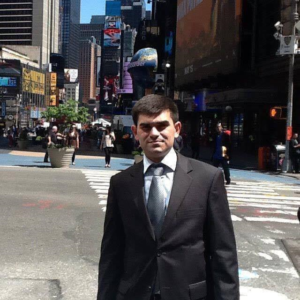 Saba Tavelishvili, second year student of Master programme in International Relations and Diplomacy from Georgia, talks about his experience at Vytautas Magnus University.
Saba Tavelishvili, second year student of Master programme in International Relations and Diplomacy from Georgia, talks about his experience at Vytautas Magnus University.
Why did you choose your study course and in WMU? Was it just lucky choice or dream that you worked for?
Well, talking about the university it’s always hard to choose as there is lots of options. However, after I’ve received the letter of acceptance I was so happy that I didn’t wait for answers from other universities and started to prepare for new challenges and experiences in Lithuania
You are studying your last year, maybe you could explain what VMU and your academic program gave to you and your personality?
First of all, I should underline the role of my university that I became more interested in academic life, I mean working on papers, articles and trying to present my works on several international or local conferences. Talking about personality I would say that I developed the sense of self-awareness as my study program is highly qualified and the professionalism of academic staff is on a high level.
What did you mostly like about VMU? Could you give our universities pluses?
About the pluses of VMU I can talk continuously, starting from friendly students and the soul of university which is so cozy that it never will leave you. But I would like to separate the internationalism of the university, lots of foreigners are coming to this university which is developing so called networking and exploring lots of cultures which is the most important thing in your life and even in our carrier.
During your studies did you participate in various university clubs or activities? What these clubs gave to you? Could you recommend something to your younger colleagues?
Well, clubs and activities is the most important part of the studies. Theoretical part can be taught from books lectures and so on, however clubs, conferences and other activities are giving a chance practically implement your knowledge, develop it and adopt yourself for future carrier, as in such activities student can find the main direction of his/her carrier. My recommendation to young generation would be to take the part in such activities as much as possible, to develop their skills of leadership, find what they want and what they like, and be to be sure that they are doing this because they really want and not just because that we need a legal paper to proof our knowledge.
Have you participated in Erasmus+ programs? If yes, was it worth the time? What experience did you receive? What differences you could tell between Lithuania studies qualities and other countries?
Erasmus+ program is one of the interesting and funniest time during the studies. First of all, you are changing a place and moving to another country and exploring it, secondly you can compare the quality of studies between the home and host universities, and in this competition always home university is winning because we are “patriots” of our university. And lastly your area of people is increasing and you are becoming the part of Erasmus family which will last during of our life.
What are your plans for the future? Do you want to work according to your specialty?
I’ve chosen IR studies because I’m really interested in this field, and my aim is to synchronize my work and specialty in the future. All my plans are connected to stay in this field, and for sure I will do PHD after I will gather an experience from the work.
Could you give some advice to those who are going to study in VMU political science faculty?
Be motivated, study hard, work hard and be friendly because VMU is the friendliest university in the world.
What are you studying?
International Relations and Diplomacy.
Interview prepared by Lukas Fabijonavičius
Public Lectures of Visiting Prof. Natalia Artemenko
On 24-28th of April a visiting prof. Natalija Artemenko (St. Petersburg State University) will be give a public lectures in the Faculty of Political science and Diplomacy. Prof. N. Artemenko works the Institute of Philosophy and research field is in phenomenology, philosophical anthropology.
| 24 04 2017 |
Phenomenology and twentieth-century European philosophy. What is phenomenology? The origins of the term ‘phenomenology’. Franz Brentano: descriptive psychology and intentionality. Brentano and Husserl Edmund Husserl: founder of phenomenology. Husserl’s Logical Investigations (1900–1901). Husserl’s discovery of the reduction and transcendental phenomenology. |
101 V. Putvinskio str. 23 |
| 26 04 2017 |
Intersubjectivity and the experience of the other (Fremderfahrung). The Crisis of European Sciences: the investigation of the life-world. Martin Heidegger’s transformation of phenomenology. Heidegger’s Being and Time. Maurice Merleau-Ponty: the phenomenology of perception. The body as expression. |
601 K. Donelaičio str. 52 |
| 28 04 2017 |
Emmanuel Levinas: the phenomenology of alterity. Ethics as first philosophy. Phenomenology in psychiatry and psychoanalysis. Theory vs. practice. Critical sketches to Heidegger’s Zollikon Seminars. Workshop: What is phenomenology? |
601 K. Donelaičio str. 52 |
World Politics and Economy – unique opportunity for student
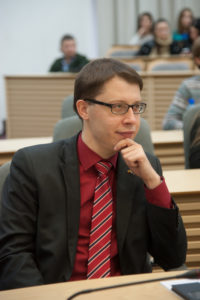
Study programme of “World Politics and Economy” provides unique opportunities for students to achieve competences in political science / international relations and economics. This is a multidisciplinary programme focusing on two core elements in contemporary world that become extremely intertwined. The changes in economies of individual states or global economic patterns directly lead to social, political and international challenges politicians, international organizations and experts have to deal with. On the other hand global challenges like climate change, migration, challenges to democracy and rule of law do not only affect politics, but also have a substantial economic impact. The students are prepared to meet those challenges, to analyse them and be able to suggest the best choices on national, regional and international levels. The programme attracts a lot of students from different countries and continents, so students have opportunities to study in multicultural environment and prepare themselves for multicultural world. After finishing studies students can find job opportunities in public and private sectors, international organizations, or start their own businesses or consulting companies. The head of the bachelor programme “World Politics and Economy” dr. Giedrius Česnakas is presenting the programme.
What goals seeking young personalities may be interested in bachelor degree programme “World Politics and Economy”? What should they expect to learn in this programme?
In my perspective the programme attracts students who are eager to gain essential knowledge not only in political science and international relations but also in economy. These three elements supplement each other very well as politics and economics become extremely interconnected. This nexus is expressed in the programme. The knowledge, how economy affects domestic and international politics and vice versa equips students for employment in public and private sectors. It has to be underlined, that the programme is international, so students learn in multicultural environment and for them this opens prospects as well as contacts for their future career.
Nowadays, it is essential to acquire practical skills for labour market. How should students acquire practical skills?
Students gain a lot of skills. First of all they have a lot of information about processes in the world and they gain knowledge to analyze them, to connect events, let us say in domestic politics of particular country to global economic tendencies, and etc. They participate in simulations, work in groups, do research, present findings, and learn critically assess information, work in multicultural environment. So the spectrum of skills is really broad.
What are the unique features of the programme “World Politics and Economy” in comparison with the other programmes in Lithuania?
This is truly interdisciplinary programme making nexus between political science and economics. Second, this programme is in English. Third, this is multicultural programme. Fourth, they work in the environment of openness and critical thinking. These four pillars make it unique.
What students can expect of this programme? Where can alumni work?
Students can expect very interesting and diverse studies, work in the environment of critical thinking, as well as multicultural environment. Students are prepared to work for the government, in ministries, nongovernmental organizations, private sector, and to create their own businesses or NGO’s, to pursue their dreams.
The third annual scientific conference
 The third annual scientific conference ‘Contemporary Political Processes: Challenges and Opportunities’ at the Faculty of Political Science and Diplomacy
The third annual scientific conference ‘Contemporary Political Processes: Challenges and Opportunities’ at the Faculty of Political Science and Diplomacy
The third annual scientific conference ‘Contemporary Political Processes: Challenges and Opportunities’, organized by the Faculty of Political Science and Diplomacy, will open on the 27th of April from 9:45 at the Small Hall at Vytautas Magnus University (Daukanto st. 28, 2nd floor).
The aim of the conference is to discuss political and security processes in Lithuania, region and the world their impact on societies. It is obvious that 2016 have been full of challenges on the global security agenda, the election in the United States of America and BREXIT forces to rethink changing positions of the West in the World Order and their global impact. 2017 will not be more peaceful – elections in France and Germany, energy security issues, changing positions of Turkey, an ongoing aggression of Russia and many other issues. A lot of those issues will be discussed in the conference.
Political sociology, political communication and technologies have a lot of attention in the conference this year. This clearly indicates the growing importance of informational impact on societies, political behaviour and formation of identities.
This year the conference will have the widest spectrum of participants and guests from abroad.
More information about the conference you will find in the conference programme.




